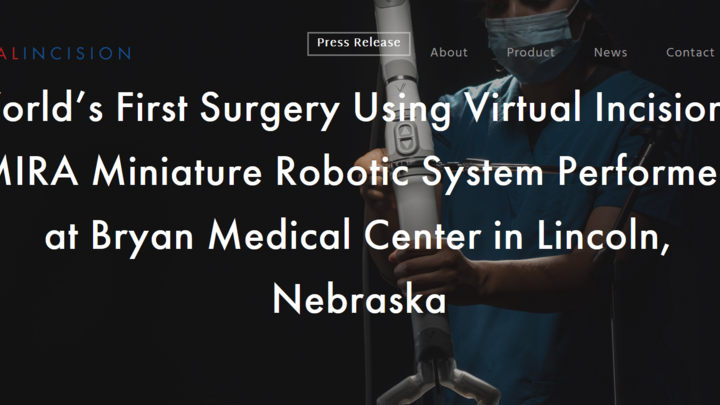World’s First Surgery Using Virtual Incision’s MIRA Miniature Robotic System Performed at Bryan Medical Center in Lincoln, Nebraska

Company Begins IDE Study, Advancing Goal of Bringing Robotically Assisted Surgery to Any U.S. Hospital or Ambulatory Surgery Center
Lincoln, Neb., and Pleasanton, Calif. – August, 16, 2021 – Virtual Incision Corporation, a medical device company pioneering first-of-its-kind miniaturized robots for laparoscopic surgery, today announced that the world’s first surgery using the MIRA™ (“miniaturized in vivo robotic assistant”) Surgical Platform has been successfully performed by Michael A. Jobst, M.D., at Bryan Medical Center in Lincoln, Neb.
The robotically assisted right hemicolectomy procedure, which was completed using the MIRA surgical platform via a single incision within the navel, was performed as part of a clinical study of MIRA under an Investigational Device Exemption (IDE) from the U.S. Food and Drug Administration (FDA). The study will be conducted at a limited number of U.S. hospitals in support of the system’s regulatory pathway to approval.
“The MIRA platform is a true breakthrough platform for general surgery, and it is extremely gratifying to be the first surgeon in the world to use the system,” said Dr. Jobst. “The procedure went smoothly, and the patient is recovering well. I’m excited to play a part in taking the first steps toward increasing access to robotically assisted surgery, which has clear benefits for patients.”
The MIRA Surgical Platform is a portable robot that allows surgeons to perform real-time minimally invasive single incision surgeries in any hospital or health center, without the need for the dedicated space or infrastructure typically required for “mainframe” robotic systems. Weighing only two pounds, the miniature platform has full robotic capabilities, and can easily be moved from room to room. The system is designed to enable complex, multi-quadrant abdominal surgeries using a simple, handheld device.
Many hospitals currently offering robotic surgeries face challenges with scheduling because the demand for minimally invasive procedures exceeds the number of available robots. Capital costs often prohibit hospitals from purchasing additional platforms. MIRA aims to present a cost-effective alternative solution that will expand access to a larger number of patients.
“We are ushering in a new era of innovation to bring the benefits of robotic surgery to patients everywhere,” said John Murphy, Virtual Incision CEO. “This first procedure is an incredible milestone that further advances our goal to expand access to the benefits of minimally invasive robotic procedures to patients to virtually any U.S. healthcare provider, regardless of the distance from an urban center. We look forward to expanding our clinical trial to additional sites and states in the coming months.”
Virtual Incision is currently focused on expanding access to minimally invasive colorectal and lower gastrointestinal procedures, the fastest-growing operational areas for patients in the United States, with more than 400,000 surgeries performed each year. Though significant technological advancements and improved patient outcomes can reduce the total cost of care, the adoption of minimally invasive colon resection has been limited, despite increasing rates of these conditions.
“The aim of creating a miniature robotic platform has always been to enable surgical teams to perform with greater operating room efficiency and surgical precision. Today we saw firsthand the benefits that a robotic assisted platform can provide over conventional surgery,” said Dmitry Oleynikov, M.D., chief medical officer and co-founder of Virtual Incision.
Beyond its initial device design for colon resection, Virtual Incision has begun developing a family of procedure-specific mini-robots for additional operations such as hernia repair, gallbladder removal and others, potentially enabling millions more surgical procedures each year. With its foundational intellectual property – including more than 200 patents and applications – Virtual Incision is poised to lead the next wave of innovation in robotic surgery with the pioneering MIRA system.
About the MIRA™ Surgical Robotic System
Unlike today’s robots that reach into the body from outside the patient, Virtual Incision’s MIRA Surgical Robotic Platform features a small, self-contained surgical device that is inserted through a single midline umbilical incision in the patient’s abdomen. Virtual Incision’s technology is designed to enable complex multi-quadrant abdominal surgeries utilizing existing tools and techniques familiar to surgeons, and does not require a dedicated operating room or specialized infrastructure. Because of its much smaller size, the robot is expected to be significantly less expensive than existing robotic alternatives for laparoscopic surgery.
About Virtual Incision
Virtual Incision is reimagining surgical robotics, with simple innovations offering mobility, flexibility and accessibility to provide minimally invasive options to more patients. The company is developing the MIRA (“miniaturized in vivo robotic assistant”) Surgical Robotic Platform, a first-of-its-kind miniaturized surgical robot, focusing first on colon resection, with follow-on specialty robots for additional potential applications such as hernia repair, gallbladder removal, antireflux surgery, splenectomy, adrenalectomy, gastric sleeve, gastric bypass, hysterectomy and hepato-pancreato-biliary procedures. The company is headquartered in Lincoln, Nebraska. For more information, visit https://virtualincision.com/.
